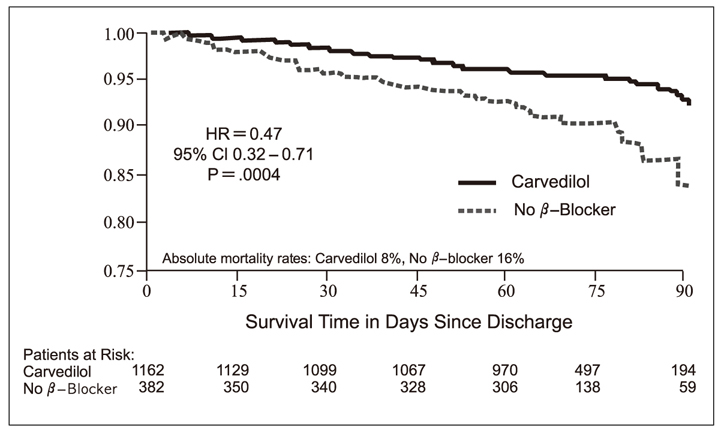J Korean Med Assoc.
2007 Mar;50(3):274-278. 10.5124/jkma.2007.50.3.274.
Role of Beta-blockers in Treatment of Heart Failure
- Affiliations
-
- 1Department of Internal Medicine, Sungkyunkwan University School of Medicine, Korea. dkkim@smc.samsung.co.kr, koroh78@empal.com
- KMID: 2184810
- DOI: http://doi.org/10.5124/jkma.2007.50.3.274
Abstract
- Anti-adrenergic medication is very important to the treatment of chronic heart failure because a failing human heart is adrenergically activated. The increase in cardiac adrenergic drive and circulating norepinephrine are damaging to a failing heart. Certain beta-blockers have been shown to improve the cardiac function and symptoms and to reduce the risk of death and hospitalization in patients with heart failure. Recently, the third-generation beta-blockers have emerged for the treatment of heart failure. This article reviews the neurohormonal pathophysiology of heart failure and the different beta-blockers and their effects.
Keyword
Figure
Reference
-
1. Eichhorn EJ, Bristow MR. Practical guidelines for initiation of beta-adrenergic blockade in patients with chronic heart failure. Am J Cardiol. 1997. 79:794–798.2. Haber HL, Simek CL, Gimple LW, Bergin JD, Subbiah K, Jayaweera AR, Powers ER, Feldman MD. Why do patients with congestive heart failure tolerate the initiation of beta-blocker therapy? Circulation. 1993. 88:1610–1619.
Article3. Kaye DM, Lefkovits J, Jennings GL, Bergin P, Broughton A, Esler MD. Adverse consequences of high sympathetic nervous activity in the failing human heart. J Am Coll Cardiol. 1995. 26:1257–1263.
Article4. Brodde OE, Schuler S, Kretsch R, Brinkmann M, Borst HG, Hetzer R, Reidemeister JC, Warnecke H, Zerkowski HR. Regional distribution of beta-adrenoceptors in the human heart: coexistence of functional beta 1-and beta 2-adrenoceptors in both atria and ventricles in severe congestive cardiomyopathy. J Cardiovasc Pharmacol. 1986. 8:1235–1242.5. Bristow MR. Changes in myocardial and vascular receptors in heart failure. J Am Coll Cardiol. 1993. 22:A61–A71.
Article6. Mann DL, Kent RL, Parsons B, Cooper GT. Adrenergic effects on the biology of the adult mammalian cardiocyte. Circulation. 1992. 85:790–804.
Article7. Packer M. Beta-adrenergic blockade in chronic heart failure: principles, progress, and practice. Prog Cardiovasc Dis. 1998. 41:39–52.
Article8. Lowes BD, Gilbert EM, Abraham WT, Minobe WA, Larrabee P, Ferguson D, Wolfel EE, Lindenfeld J, Tsvetkova T, Kobertson AD, Ouaife RA, Bristow MR. Myocardial gene expression in dilated cardiomyopathy treated with beta-blocking agents. N Engl J Med. 2002. 346:1357–1365.
Article9. Reiter MJ. Cardiovascular drug class specificity: beta-blockers. Prog Cardiovasc Dis. 2004. 47:11–33.10. Fonarow GC, Abraham WT, Albert NM, Stough WG, Gheorghiade M, Greenberg BH, O'Connor CM, Sun JL, Yancy C, Young JB. Carvedilol use at discharge in patients hospitalized for heart failure is associated with improved survival: an analysis from Organized Program to Initiate Lifesaving Treatment in Hospitalized Patients with Heart Failure (OPTIMIZE-HF). Am Heart J. 2007. 153:82. e1–82. e11.
Article11. Bristow MR. beta-adrenergic receptor blockade in chronic heart failure. Circulation. 2000. 101:558–569.
Article12. Newton GE, Azevedo ER, Parker JD. Inotropic and sympathetic responses to the intracoronary infusion of a beta2-receptor agonist: a human in vivo study. Circulation. 1999. 99:2402–2407.
Article13. Bristow MR. Mechanism of action of beta-blocking agents in heart failure. Am J Cardiol. 1997. 80:L26–L40.
Article14. Le Coz F, Sauleman P, Poirier JM, Cuche JL, Midavaine M, Rames A, Le cocq B, Jaillon P. Oral pharmacokinetics of bisoprolol in resting and exercising healthy volunteers. J Cardiovasc Pharmacol. 1991. 18:28–34.
Article15. Nichols AJ, Gellai M, Ruffolo RR Jr. Studies on the mechanism of arterial vasodilation produced by the novel antihypertensive agent, carvedilol. Fundam Clin Pharmacol. 1991. 5:25–38.
Article16. Gilbert EM, Abraham WT, Olsen S, Hattler B, White M, Mealy P, Larrabee P, Bristow MR. Comparative hemodynamic, left ventricular functional, and antiadrenergic effects of chronic treatment with metoprolol versus carvedilol in the failing heart. Circulation. 1996. 94:2817–2825.
Article17. Yoshikawa T, Port JD, Asano K, Chidiak P, Bouvier M, Dutcher D, Roden RL, Minobe W, Tremmel KD, Bristow MR. Cardiac adrenergic receptor effects of carvedilol. Eur Heart J. 1996. 17:S. 8–16.
Article18. Gilbert EM, Anderson JL, Deitchman D, Yanowitz FG, O'Connell JB, Renlund DG, Bartholomew M, Mealey PC, Larrabee P, Bristow MR. Long-term beta-blocker vasodilator therapy improves cardiac function in idiopathic dilated cardiomyopathy: a double-blind, randomized study of bucindolol versus placebo. Am J Med. 1990. 88:223–229.
Article19. Cockcroft JR, Chowienczyk PJ, Brett SE, Chen CP, Dupont AG, Van Nueten L, Wooding SJ, Ritter JM. Nebivolol vasodilates human forearm vasculature: evidence for an L-arginine/NO-dependent mechanism. J Pharmacol Exp Ther. 1995. 274:1067–1071.20. Uhlir O, Dvorak I, Gregor P, Malek I, Spinarova L, Vojacek J, Van Nueten L. Nebivolol in the treatment of cardiac failure: a double-blind controlled clinical trial. J Card Fail. 1997. 3:271–276.
Article21. Lechat P, Escolano S, Golmard JL, Lardoux H, Witchitz S, Henneman JA, Maisch B, Hetzel M, Jaillon P, Boissel JP, Mallet A. Prognostic value of bisoprolol-induced hemodynamic effects in heart failure during the Cardiac Insufficiency BIsoprolol Study (CIBIS). Circulation. 1997. 96:2197–2205.
Article
- Full Text Links
- Actions
-
Cited
- CITED
-
- Close
- Share
- Similar articles
-
- The Role of Beta Blockers in Treating Hypertensive Patients
- Beta-Blockers in Heart Failure with Preserved Ejection Fraction: Could Their Use Be Vindicated as an Acceptable Option in the Future Treatment Guideline?
- Role of Angiotensin II Receptor Blockers in the Treatment of Congestive Heart Failure
- Management of Chronic Heart Failure in Congenital Heart Disease
- Animal models of heart failure and new molecular strategy for the treatment of heart failure


